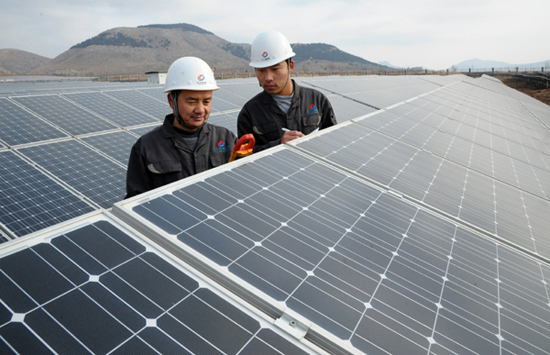
Workers from a solar manufacturing company in Shandong province check solar panels on Wednesday. (PHOTO BY LI ZONGXIAN / FOR CHINA DAILY)
China's solar manufacturing industry has risen from insignificance to dominating the globe in the past decade.
But that position is now being put to the test by an anti-subsidy investigation the United States began in October 2011 and an anti-dumping investigation started by the European Union this year.
Solar-power generators have largely been unaffordable to domestic users.
Ninety percent of Chinese solar products are exported, making the recent trade disputes begun by the EU and US markets particularly troublesome.
Wan Gang, minister of science and technology, said the photovoltaic industry's current difficulties "won't last long".
"China has already installed the largest number of solar devices in the world, but that still does not match our production capacity," Wan said.
"That is why we carried out projects to allow small distributed solar power generators to connect to the grid starting in 2009."
A test project in Zhangbei county of Hebei province led to the installation of a 60-megawatt wind power generator, 40-mW solar power generator and 20-mW energy storage unit. The solar panels generate power in the daytime, when the wind does not blow strongly, and the wind generator works at night.
"The test project in Zhangbei is proving that we can guarantee we have a sustainable and steady power supply with clean energy and generate no greenhouse gases or pollution," Wan said. "We should carry out more projects like this."
By 2015, China will have 21 million kilowatts of solar power generating capacity, up from the current 10 million kW, according to the country's 12th Five-Year Plan (2011-15) on solar energy, which was published by the National Energy Administration.
"It isn't that there are too many solar power generators in the world, but rather that there are too few," Wan said. "After all, house owners are all willing to install solar panels on their roofs to give them more heat and make things more convenient."
Barriers ahead
Solar devices will not have a large market unless some policy barriers are lifted, experts said.
"Unlike people in Europe, most urban residents in China live in high-rise buildings, which means that they have to share roofs with their upstairs or downstairs neighbors," said Li Ang, senior campaigner for the environmental organization Greenpeace's climate change and energy project.
"So it's difficult for any individual resident to install photovoltaic systems without having the permission of all of the other neighbors under the same roof."
Li said a photovoltaic system costs about 20 yuan per watt, which means users who want to be able to turn on their refrigerators and air conditioners at the same time have to spend 40,000 to 60,000 yuan on a system.
"Unless we can sell the extra electricity produced during the daytime back to the power grid, using photovoltaic systems will not be users' first choice," Li said.
Before October, users had to pay to connect their solar power generator to the power grid, and the cost of one network access point was as high as 420,000 yuan.
And State Grid Corp, China's largest State-owned power utility company, announced on Oct 26 that it will provide free connections for small, independent producers of photovoltaic solar electricity starting on Nov 1. The announcement was taken as being a boon to users of solar energy.
The announcement said State Grid will be responsible for covering the cost of the connections.
Tang Wenqian, deputy secretary-general of the Chinese Renewable Energy Industries Association, said State Grid's new policy will not have a substantial effect on the photovoltaic market.
"State Grid should have helped people connect to its power grid," Tang said.
"The new announcement just shows the company's changing attitude, but big changes will only be possible after subsidy standards come out."
Currently, State Grid pays 1 yuan per kilowatt-hour for the electricity generated by photovoltaic systems. But Tang said the government should offer more subsidies to photovoltaic users.
"The photovoltaic system costs a lot of money, and without government subsidies, users will stick to the cheaper types of power — thermal power, for instance, " she said.
On Dec 19, the State Council held a meeting to discuss measures to boost the development of the solar industry.
Five policies won approvals at the meeting, including various ones that called for exploring the domestic solar-energy market, increasing government subsidies to solar energy users and encouraging more private users to connect their solar-power generators to the grid.
Source: - People's Daily Online
Solar energy faces obstacles abroad and at home - People's Daily Online
http://english.peopledaily.com.cn/90778/8075203.html
No comments:
Post a Comment